9 Best Fruit Tree Fertilizers In 2025: Spikes, Liquid and More
by Carl Anderson
Updated on Dec 31, 2024
We took a deep dive into the top 10 fertilizers for fruit trees, so you don’t have to stress about giving your trees the nutrients they need.
From fertilizer spikes to liquid formulas and the all-important NPK ratios, we’ve got it all covered. Check out our roundup of the best fertilizers for fruit trees and find the perfect fit for your orchard.
List of Services
-
Best For Fruit and Citrus Trees - Jobe's Organic GranularList Item 1
The Jobe's Organics fertilizer is specialized for citrus trees but can also be used for other fruits. You can use it on both new and established trees. Certified organic.
-
Best All Purpose - Espoma Organic Plant ToneList Item 2
The Espoma Organic Plant Tone is a slow-release fertilizer that breaks down overtime and offers a long-lasting nutrient reserve to your fruit trees.
-
Best For Orchards - Down to Earth 6-2-4 BlendList Item 3
Down to Earth Blend is a great 6-2-4 Blend that you can use for most fruits, from plums and mangoes to pears, apples, figs, and plums. The fertilizer is also fit for shrubs, trees, and fruiting canes.
-
Best Spikes - Miracle Grow Fruit & Citrus
Can't go wrong with the Miracle-Gro Fruit & Citrus Spikes. They promote lush foliage and better fruit production.
-
Best Organic - Dr. Earth
The DR EARTH Natural Wonder fertilizer has a quick-release effect, providing nutrients to your fruit tree for a few months. Its scientific formula ensures optimal results for your fruit trees.
-
Best Granular - Jobe's Fruit and Nut
The Jobe's Organics Fruit & Nut Granular fertilizer is specifically designed for fruit and nut trees. It works equally well on both young and established trees.
Jobe's Organic Granular - Cheap and Inexpensive way to get the best nutrients to your fruit trees. This 3-5-5 blend is great for any fruit or citrus tree. Check it out here.
Table of Contents
- The Top 12 Best Fruit Tree Fertilizers - Full Analysis (Updated for 2025)
- Best Overall
- Best All Purpose
- Best Blend for Orchards
- Best Spikes
- Best Organic
- Best Granular
- Best Water Soluble
- Best For Tomatoes
- Best Fish Fertilizer for Fruit Trees
- Sweet New Earth's Top Pick
- How We Chose The Best Fertilizer
- Liquid
- Water Soluble
- Granular
- Spikes
- FAQs
Things to Consider Before Buying
Liquid
Liquid Fertilizers don't need any mixing or concocting. Most of the time, you can add it to your plant's soil or inject it through a drip line. They usually don't require any sort of extra work to get nutrients to your plants but they may not be the best for every fruit tree in every situation.
Water soluble
Water-soluble fertilizers are exactly that: they easily dissolve into water and can be applied to a fruit tree's roots. Most of the time, you inject a water-soluble fertilizer into a drip line to get the right nutrients to the tree.
Granular
Granular fertilizer is the old-fashioned and most common fertilizer. Sometimes they decompose fast, often times they need a few weeks to decompose to be effective for the tree's roots. Think fast release vs slow release fertilizer.
Spikes
Spikes are another type of fertilizer that are slow-release. You dig them into a spot around the tree's roots to slowly release nutrients over time. Some are better than others, so make sure to DYOR to make the right decision for your tree.
The Top 9 Best Fruit Tree Fertilizers - Full Analysis (Updated for 2025)
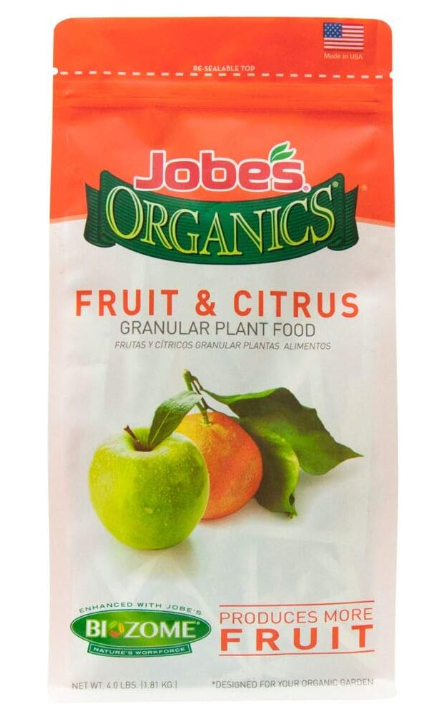
The Jobe's Organics fertilizer is specialized for citrus trees but can also be used for other fruits. You can use it on both new and established trees. Since it is certified organic, the fertilizer does not contain synthetic ingredients.
It contains Jobe's Biozome, which is the company's trademarked blend of ingredients. Besides minerals, the fertilizer also contains microorganisms that break down the fertilizer for quicker absorption by the plant.
Besides nurturing your tree, Jobe's Organics also improves the condition of the growing soil, especially during drought. The fertilizer has an NPK ratio of 3-5-5, which is ideal for maturing citrus trees.
PROS
- Contains the Jobe's Biozome for fertilizer breakdown
- Breaks down quickly in the soil
- Works for new plants too
CONS
- Has a terrible scent
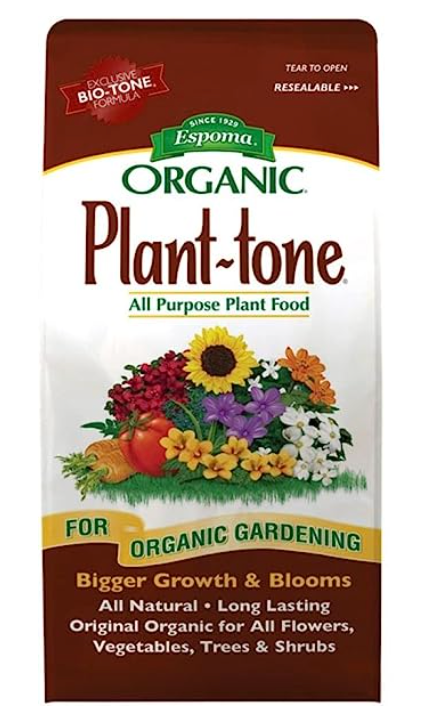
The Espoma Organic Plant Tone is a slow-release fertilizer that breaks down overtime and offers a long-lasting nutrient reserve to your fruit trees. To allow decomposition, it must be applied 1 to 2 weeks before the last average frost date.
You can use it on the following types of flowers; perennials, roses, and annuals. It's also ideal for vegetables like tomatoes, squash, lettuce, and peppers. Similarly, it works on shrubs and trees.
The 5-3-3 NPK ratio is supplemented with 5% calcium. Since the fertilizer is free of toxic ingredients and sludges, it will not damage your sensitive fruit trees. Although the packaging has instructions for when and how to use the fertilizer, the best way to apply it is to spread it around the plant's drip line and follow it up with thorough watering.
PROS
- Is ready to use
- Can be applied to most fruit trees
- Is a slow-release fertilizer
CONS
- Costly
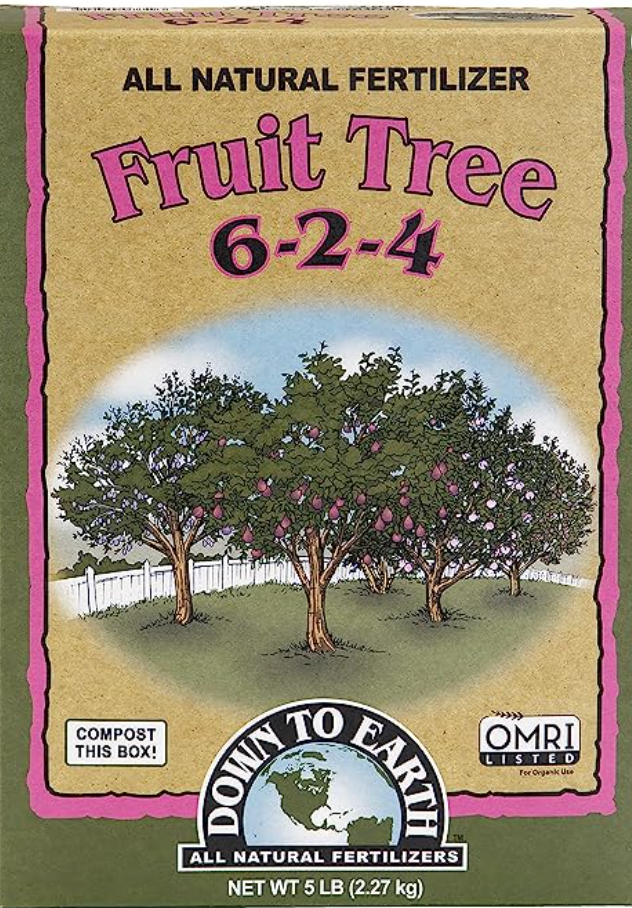
The Down to Earth Organic fertilizer comes in two variations; 5lb and 15lb bags. It has a 6-2-4 formula, being rich in nitrogen and potassium. The fertilizer has been specifically made to nurture orchards, allowing them to produce delicious fruits.
Besides primary nutrients, the fertilizer also offers calcium to your fruit trees. You can use this fertilizer for most fruits, from plums and mangoes to pears, apples, figs, and plums. The fertilizer is also fit for shrubs, trees, and fruiting canes.
This Down to Earth Organic fertilizer includes fish bone, calcium carbonate, feather meal, potassium sulfate, kelp meal, and alfalfa meal.
PROS
- Contains high-quality ingredients
- Useful for various fruit trees
- Also works for shrubs and trees
CONS
- Instructions may be hard to follow
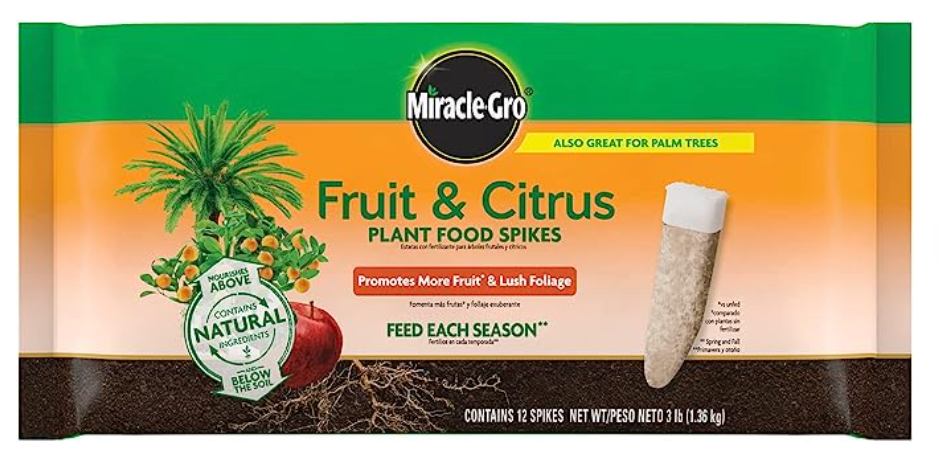
The Miracle-Gro Fruit & Citrus fertilizer promotes lush foliage and better fruit production. It's a blend of natural ingredients that work together to help your tree produce more and bigger fruit.
One application of this fertilizer per season, in early spring or summer, is enough. Besides fruit trees, the fertilizer is also useful for palm trees.
It releases nutrients into the tree's root zone for strong fruit and citrus production. The spikes are placed around the tree's root zone, near the trunk.
PROS
- Nourishes the root zone directly
- Easy to spread
- Excellent value for money
CONS
- Poor control over the nutrient spread
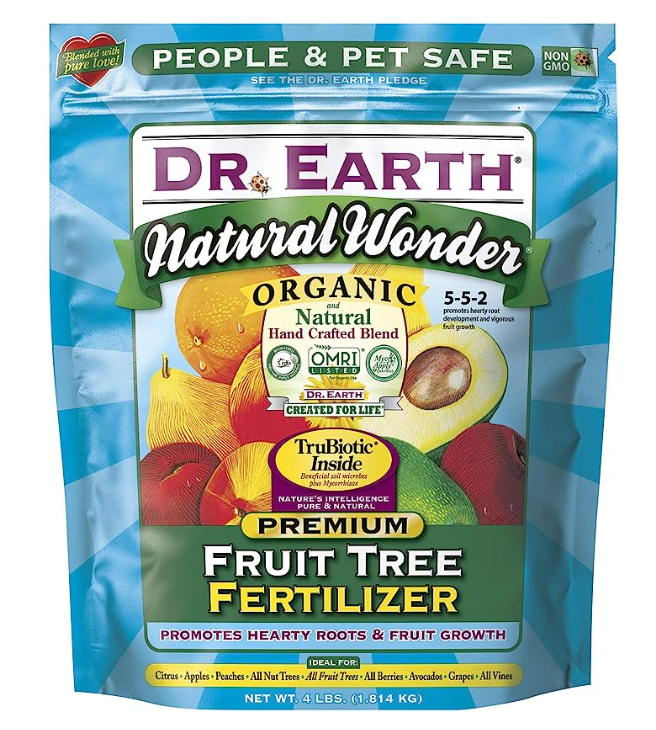
The DR EARTH Natural Wonder fertilizer has a quick-release effect, providing nutrients to your fruit tree for a few months. Its formula has gone through rigorous scientific testing to ensure optimal results.
It contains minerals, enzymes, probiotic microbes, and other natural materials that are beneficial to your fruit tree's growth. Some of its ingredients include feather meal, bone meal, alfalfa meal, kelp meal, and cottonseed meal.
You can use this fertilizer on a wide range of trees, including citrus, plums, apples, berries, and peaches. The 5-5-2 NPK ratio of the fertilizer accelerates root and shoot development.
PROS
- Helps hearty root development
- Releases quickly into the soil
- Has a high-quality blend of ingredients
CONS
- Not suitable for fruiting periods
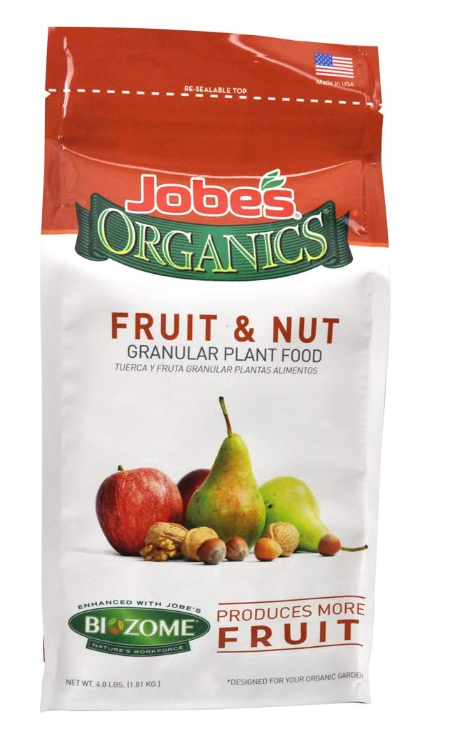
The Jobe's Organics Fruit & Nut Granular fertilizer is specifically designed for fruit and nut trees. It works equally well on young and established trees. Jobe's proprietary Biozome improves the growing soil's conditions and makes your fruit trees resistant to insects, drought, and diseases.
The microorganism mix in this organic fertilizer helps in quick nutrient breakdown. As a result, the fruit trees can absorb these minerals quickly. Being certified organic, the fertilizer is free of synthetic chemicals.
PROS
- No synthetic chemicals
- Ideal for fruit and nut trees
- Easy to use
CONS
- Unbearable scent
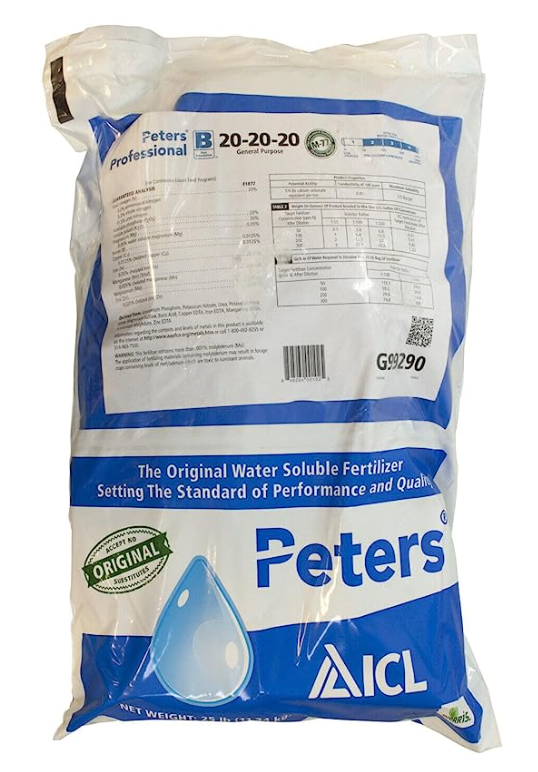
Peters General Purpose Fertilizer is the best option for evergreen trees with immediate nutritional needs. With a 20-20-20 NPK ratio, the fertilizer has a high concentration of all three primary nutrients.
The high nitrogen content of this fertilizer helps the tree in foliar expansion. It also contains urea-nitrogen and ammonium, which are great for leafy growth. The phosphorus content helps in root establishment and flower production.
Since the fertilizer comes in a 25lb bag, you can simply buy it once and use it for the whole year.
PROS
- Available in a large bag
- Releases nutrients quickly
- Has micronutrients too
CONS
- Not specifically for fruit development
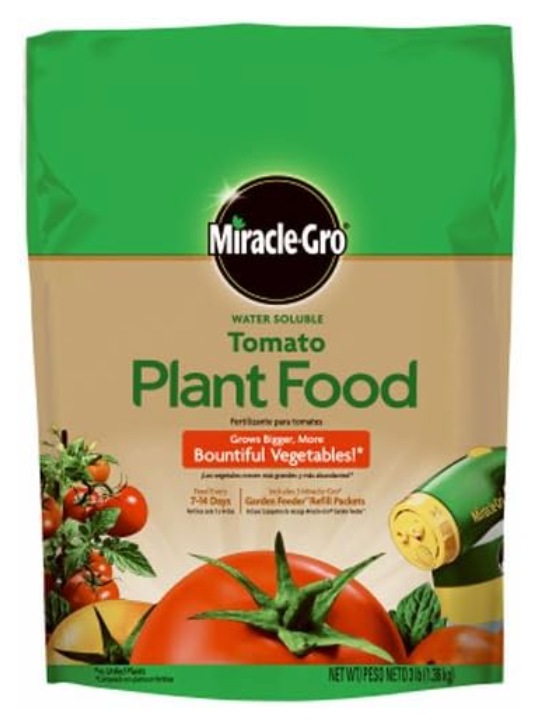
The Miracle-Gro fertilizer is ideal for tomatoes and other vegetables. When you use it per the manufacturer's instructions, it will not cause burns.
You can use this fertilizer in different ways. One, you can fill a feeder jar with the Miracle-Gro fertilizer or put a tablespoon of this plant food in your watering can. If you plan to use it on indoor plants, mix half a teaspoon of this plant food per water gallon.
The 18-18-21 NPK ratio translates to a concentration of nitrogen, phosphorus, and potassium. With their presence, this fertilizer will help the tomatoes grow bigger and more bountiful.
PROS
- Can be used on indoor and outdoor plants
- Does not cause burns
- Has a high mineral concentration
CONS
- Needs to be applied frequently
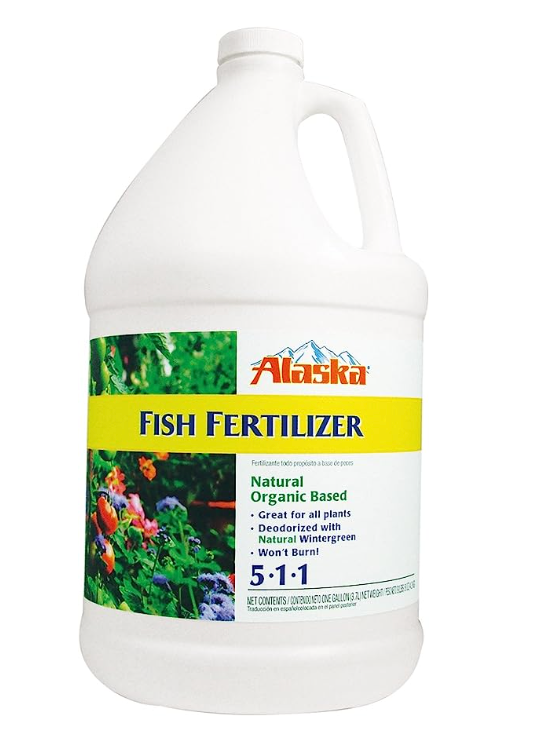
The Alaska Fish Emulsion is the best fish fertilizer for fruit trees because it is a burn-free alternative to regular fertilizers. It also contains secondary nutrients, like calcium, that supplement the action of nitrogen, potassium, and phosphorus.
Being a fish fertilizer, it also provides proteins to the microbes in the soil. It helps them build a soil food web that's robust enough to sustain fruit tree growth for the long term.
Although most fish emulsions smell terrible, the Alaska Fish Emulsion is not as bad. The manufacturers have deodorized it with Wintergreen, which has a strong woody and aromatic scent. It still has a bad smell, but it's somewhat bearable.
PROS
- Does not cause burns
- Contains secondary nutrients
- Improves soil quality
CONS
- Has a putrid smell
Sweet New Earth Final Choice of the Best Fruit Tree Fertilizer
In our opinion, the best fertilizer for fruit trees is Jobe's Organics Granular Plant Food Fruit & Citrus. First, it's an organic fertilizer that does not harm you, your pets, your kids, or the plants.
Second, it contains the company's Biozome, which aids in mineral breakdown so that the plants can absorb them easily. Jobe has been in the fertilizer market for a long time, and their products have always exceeded expectations.
The best part about this fruit tree fertilizer is that it does not only provide nutrition for the plant. It also improves the soil condition to assist tree growth.
How We Chose the Best Fertilizer for Fruit Trees
At Sweet New Earth, we look at a few factors to select the best fertilizer for fruit trees. Here are the factors we considered to put together this list:
- Liquid
- Water soluble
- Granular
- Spikes
Liquid
Liquid fertilizers have become increasingly common in recent years due to their advantages. For one, the nutrients in liquid fertilizers are immediately available to the plants. Since liquid fertilizers are easy to use, they've become common for amateur gardeners.
Every drop of a liquid fertilizer has the same nutrient ratio. These fertilizers allow even food distribution for plants.
Unlike slow-release granular and spike fertilizers, liquid fertilizers provide nutrients to plants faster. So, you can use them for plants that need immediate nutrition.
When using liquid fertilizers, it's also important to consider their downsides. In some cases, they may result in a growth surge. While this may be an advantage for some gardens, it can create problems for others. Too much growth will create competition for resources among your plants.
You also need to re-apply liquid fertilizers more often. They also tend to be more expensive and have a shorter shelf life.
Water Soluble
If you look at our list, you'll notice that we have selected quite a few water-soluble fertilizers. The main reason for us choosing these fruit tree fertilizers is their ability to provide nutrition to plants quickly.
Water-soluble fertilizers are usually in powder form and dissolve in water easily. The application involves spreading the powder along the plant's root zone or the drip line. After that, you have to water the area thoroughly.
Like liquid fertilizers, water-soluble fertilizers are also quick-release. So they do not stay in the soil for a long time. You'll have to re-apply the fertilizer every few weeks for the best results.
These fertilizers are also more expensive than their granular counterparts. If you have too many fruit trees, this may be a burden on your pocket.
Granular
Before you buy a granular fertilizer for your fruit trees, there are a few things you need to keep in mind. Unlike liquid fertilizers, granular plant foods are not as mobile in the soil. So, they do not get as close to the plant's roots as liquid fertilizers do.
Granular fertilizers do not have the same amount of nutrients per granule either. However, the good news is that granular fertilizers are cheaper in bulk. It's also easier to store them since they do not settle out with time.
Granule fertilizers are also slow-release, so they provide nutrients to the fruit trees slowly. As a result, they do not require frequent applications.
Spikes
Fertilizer spikes release nutrients slowly into the soil. The microbial activity in the soil is responsible for triggering the release of nutrients from these spikes.
The spikes are inserted around the drip line of the fruit tree, making sure that you do not damage the roots.
One of the main advantages of using spike fertilizers is that you do not have to water them. You can simply insert them in the soil, and that's it.
Also, spikes do not cause over-fertilization since they contain pre-measured amounts of nutrients. You can buy spikes based on the type of fruit tree to ensure that it gets the right amount of nutrients.
NPK Ratio
The NPK ratio represents the three primary nutrients in the fertilizer. These include:
- Nitrogen
- Phosphorus
- Potassium
For example, if a fertilizer has a 10-10-10 NPK ratio, it will have 10% nitrogen, 10% phosphorus, and 10% potassium. Most fertilizers contain all three primary nutrients. If a fertilizer does not have a certain macronutrient, it will show 0 in the NPK ratio.
For example, if a fertilizer does not have any phosphorus, it will have an NPK ratio of 10-0-10.
With regards to the NPK ratio, there can be two types of fertilizers; complete and incomplete. A complete fertilizer has all three main nutrients. Meanwhile, an incomplete fertilizer does not have one or more of these nutrients.
For example, 10-10-10 is a complete fertilizer, while 10-0-10 is an incomplete fertilizer. You might wonder why a fruit tree may need an incomplete fertilizer.
Some soils may not be deficient in a certain nutrient and may only need another one. In that case, an incomplete fertilizer may be used to provide the required amount of nutrients.
If you're unsure about the best fertilizer for fruit trees in your garden, conduct a soil test. It is a simple and inexpensive method to determine the nutrients present in the soil. After that, you can choose an appropriate fertilizer based on the results.
Inorganic vs. Organic Fertilizer
An inorganic fertilizer has ingredients sourced from industrial procedures or extraction. These fertilizers are also called chemical or mineral fertilizers. Common ingredients are nitrate, phosphate, and potassium.
On the other hand, organic fertilizers contain ingredients from natural sources like chicken manure, cow manure, compost, and other naturally occurring materials.
A notable difference between both these fertilizer types is how the plants absorb them. Inorganic fertilizers are readily soluble, making them available to a fruit tree quickly. The downside here is that some amount of the fertilizer is lost due to leaching and soil erosion.
Organic fertilizers have to be broken up by soil microbes first. The microorganisms break down the organic fertilizer so that the minerals are readily available to the plant. Due to this, organic fertilizers feed the plant and nourish the soil at the same time.
Other Things to Consider for Fruit Tree Fertilizer
Type of Fruit Tree
One of the main considerations when choosing the right fertilizer is the type of fruit tree. For example, citrus trees need a 13-13-13 fertilizer during the first three years of growth. After that, they need a 15-5-10 fertilizer.
Apple trees need a fertilizer with an NPK ratio of 12-12-12 or 11-15-15 when young. Most growers put about 1 to 4 lbs of fertilizer. If you need a citrus tree, the best citrus tree fertilizer would have an NPK ratio geared towards citrus fruit.
Besides the type, the age of the fruit tree will also determine the fertilizer it needs. Established fruit trees will have higher fertilizer needs, whereas indoor fruit trees require less fertilizer.
When choosing a fertilizer, check the requirements for your fruit tree. Most fertilizer manufacturers also specify the type of tree that their product is best suited for. You wouldn't pick out a palm tree fertilizer for a fruit tree, although most do have some crossover.
Soil pH
Conducting a soil test is necessary to determine the type of fertilizer you need for healthy growth. If the soil has poor nutrient quality, go for organic fertilizers. These fertilizers improve soil quality.
Fertilizers also affect the soil pH. Nitrogen present in organic fertilizers increases the soil acidity. If your fruit tree requires alkaline or neutral soil, reduce the amount of nitrogen-containing fertilizer application.
NPK Ratio
The NPK ratio will determine if the fertilizer is better for root development, flowering, or fruiting. Opt for a high-nitrogen fertilizer if you want your plant to grow healthy leaves and shoots. For flowering, choose a fertilizer with a 3-1-2 ratio.
A balanced fertilizer has equal amounts of nitrogen, potassium, and phosphorus. You can use such a fertilizer for all-purpose use.
Inorganic vs Organic
Choose between organic and inorganic fertilizers, depending on the soil type and preference. Inorganic fertilizers contain quick-release nutrients that are immediately available for plants. On the other hand, choose organic fertilizers if your plants need a slow-release fertilizer.
Application Method
There are different application methods for fertilizers, including granular, liquid, spike, and water-soluble. Opt for a water-soluble or liquid fertilizer if you want to provide quick nutrition to your plants. Meanwhile, spike and granular fertilizers are better for long-term soil nutrition.
Tree Age
Mature fruit trees have higher nutritional requirements than young trees. Initially, a fertilizer with a low nitrogen concentration will suffice. But as your tree grows older, increase the concentration of nutrients gradually.
FAQs

Carl Anderson is the main author of Sweet New Earth. He is an avid outdoors enthusiast who loves gardening. He spends his time reading, hiking and learning about new ways to optimize his garden. You can learn more about him here.
